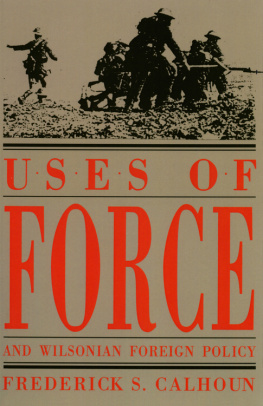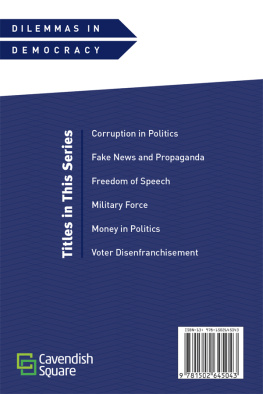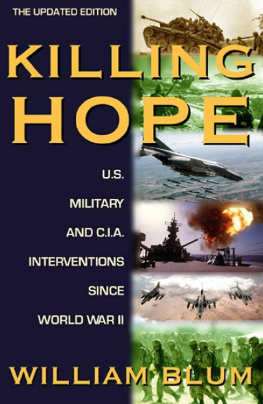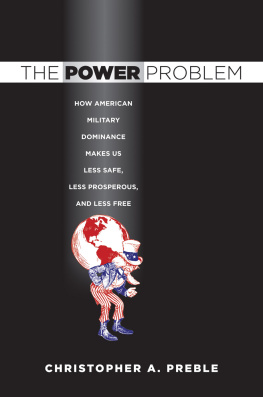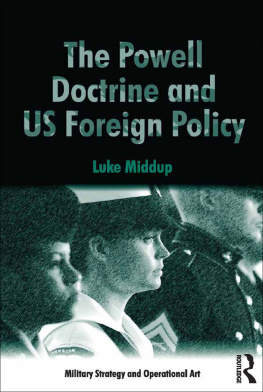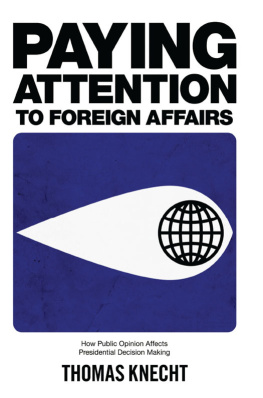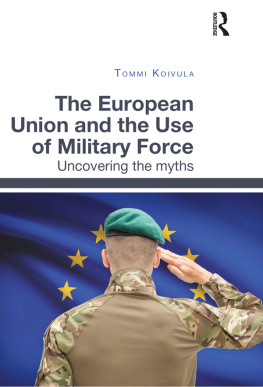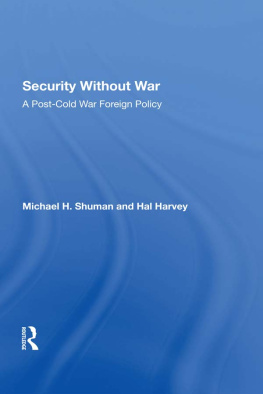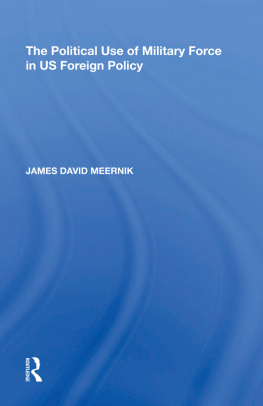USES OF FORCE AND WILSONIAN FOREIGN POLICY
AMERICAN DIPLOMATIC HISTORY
Lawrence S. Kaplan, Editor
Aftermath of War: Americans and the Remaking of Japan, 19451952
Howard B. Schonberger
The Twilight of Amateur Diplomacy: The American Foreign Service and Its Senior Officers in the 1890s
Henry E. Mattox
Requiem for Revolution: The United States and Brazil, 19611969
Ruth Leacock
American Historians and the Atlantic Alliance
edited by Lawrence S. Kaplan
The Diplomacy of Pragmatism: Britain and the Formation of NATO, 19421949
John Baylis
Uses of Force and Wilsonian Foreign Policy
Frederick S. Calhoun
USES OF
force
and Wilsonian Foreign Policy
FREDERICK S. CALHOUN
The Kent State University Press
Kent, Ohio, and London, England
1993 by The Kent State University Press, Kent, Ohio 44242
All rights reserved
Library of Congress Catalog Card Number 92-31632
ISBN 0-87338-464-4
Manufactured in the United States of America
Library of Congress Cataloging-in-Publication Data
Calhoun, Frederick S.
Uses of force and Wilsonian foreign policy / Frederick S. Calhoun.
p. cm. (American diplomatic history)
Includes bibliographical references and index.
ISBN 0-87338-464-4 (pbk. : alk. paper)
1. United StatesForeign relations19131921. 2. Wilson,
Woodrow, 18561924Views on intervention. 3. Intervention
(International law) I. Title. II. Series.
E768.C354 1993
British Library Cataloging-in-Publication data are available.
To Ken and Holly Hargreaves
la recherche du temps perdu
CONTENTS
1. The Uses of Force
in Wilsonian Diplomacy
T his book has been a dozen years in the making, not because the ideas were so difficult nor the research so overwhelming nor even the writing so terribly hard. Thanks to the faith and support of my good friend John T. Hubbell at The Kent State University Press, even publishing it went reasonably smoothly. Other tasks and diversions simply intervened to keep me from it. I first developed the idea for a vocabulary of force based on Woodrow Wilsons multiple resorts to force as the subject of my doctoral dissertation in the late 1970s. At the time it seemed a good idea to provide a general history of each of Wilsons seven military interventions before defining the various uses of force on which he relied.
So I set about to write that general history, thinking always of it as Part One of some larger study defining the uses of force. As I finished each chapter, I dutifully sent it off to my adviser. When I finally got through the twin interventions in northern Russia and Siberia, I put the chapters in the mail with a note indicating that Part One was now complete. I vowed to begin Part Two.
By return mail my adviser advised me that enough was enough; Part One was sufficient for a dissertation and, ultimately, for a book of its own. For that wise counsel, I am grateful for the kind intercession of Akira Iriye. He insisted that I divide into more easily digestible pieces my theories of Woodrow Wilson, his power and principles, and his uses of force. Iriye not only guided my graduate studies, delivering me to some level of maturity as a historian, but also has continued over the years to offer me the benefit of his guidance. I know of no greater historian.
Once my dissertation was complete, it was then of course necessary to earn a living and begin supporting my family. In 1984 Stanley E. Morris hired me to write a history of the United States Marshals. My work on The Lawmen: United States Marshals and Their Deputies, 17891989 (Smithsonian Institution Press, 1990) again kept me from finishing Part Two. Curiously, though, the marshals complemented my work on Wilson. In Power and Principle, I studied the governments application of power internationally; in The Lawmen, I studied its domestic application.
For the past seven years, I have worked with a group of men and women who use force professionally. Seeing it expressed at that primal level has given me a considerably different perspective on force. Reading eighty-year-old letters and reports of Wilsonian interventions is one thing; watching (from a distance) a deputy marshal, weapon to hand, kick in the door of a wanted felons house is quite another. I am grateful to all those deputies, and there are a large number of them now, who suffered my curiosityand kept me from harmas they risked their lives chasing fugitives, protecting judges, escorting prisoners, or executing the orders of the courts.
Over the years a number of good friends have debated my ideas with me, challenging me to think more thoroughly than I am accustomed to doing. I am grateful to Steve Wheatley and Jack Michel, Deborah Gough and Nancy Protheroe, Barry Karl and Friedrich Katz, and David Trask and Jonathan Utley. Lloyd Ambrosius read the manuscript and offered many useful suggestions and critiques. I also imposed upon a number of friends to read it. Jeff Miller and Roger Archega, Michael McShane and Ana-Marie Sullivan, and Akira Iriye and Cynthia G. Fox each gave invaluable comments on the early drafts of this book. They improved it considerably, though I am afraid that my native Southern intransigence may have kept those improvements to a minimum.
As always, my parents, Jim and Eleanor Calhoun, sustained me beyond the point of parental support or filial recompense. Their faith in me and my future has always been the brightest beacon guiding me.
Ken and Holly Hargreaves, more than anyone else outside my family, have suffered with me the writing of three histories. Their influence has been immeasurable, their friendship irreplaceable.
My wife Leslie has occasionally been able to remind me that there is life beyond Wilson and the United States Marshals. She and our children, Austin and Emily, have enriched that life with their love.
And to Amy Blake Calhoun, who was born just as I finished reviewing the final page proofs to this book, I can only repeat what I once wrote her older brother and sister. I hope that she will grow up in a world where the subject of this book will be an archaic curiosity. The first step to achieving that is understanding. I haveagaintried to take that step.
The ideas, conclusions, interpretations, and errors in this study are purely my own and do not represent the views of the many friends and advisers who helped me with it. Nor are they the views or interpretations of any of my employers, past or present.
USES OF FORCE AND WILSONIAN FOREIGN POLICY
The Uses of
FORCE
F orce achieves many international goals. Nations turn to arms to defend their territories or to steal more; to protect their citizens or to punish others; to exert their independence or to subdue it in others; to resolve disputes or to impose their views. Wars have been fought over God and women, gold and land, glory and status. The Greeks fought for a decade to rescue Helen of Troy; the crusaders battled for two centuries to reclaim the Holy Land. Throughout history, national leaders have accepted force as a convenient method to express their will, whether toward their own peoples or toward the peoples of foreign lands.
In a previous book, I suggested that international power assumes many formsdiplomatic, economic, moral, military (the threat of force), and armed power (the actual use of force). To examine the subject of power, the study used force as the example, policy as the theme. The presidency of Woodrow Wilson provided the setting. Wilson repeatedly relied on force to implement his foreign policies. Between April 1914 and July 1918, he embarked on seven armed interventions, a record unsurpassed by any other American president. Wilson dispatched military expeditions twice into Mexico, into Haiti, the Dominican Republic, the battlefields of World War I, northern Russia, and Siberia. In Wilsonian foreign policy, force was an adjunct to diplomacy.

